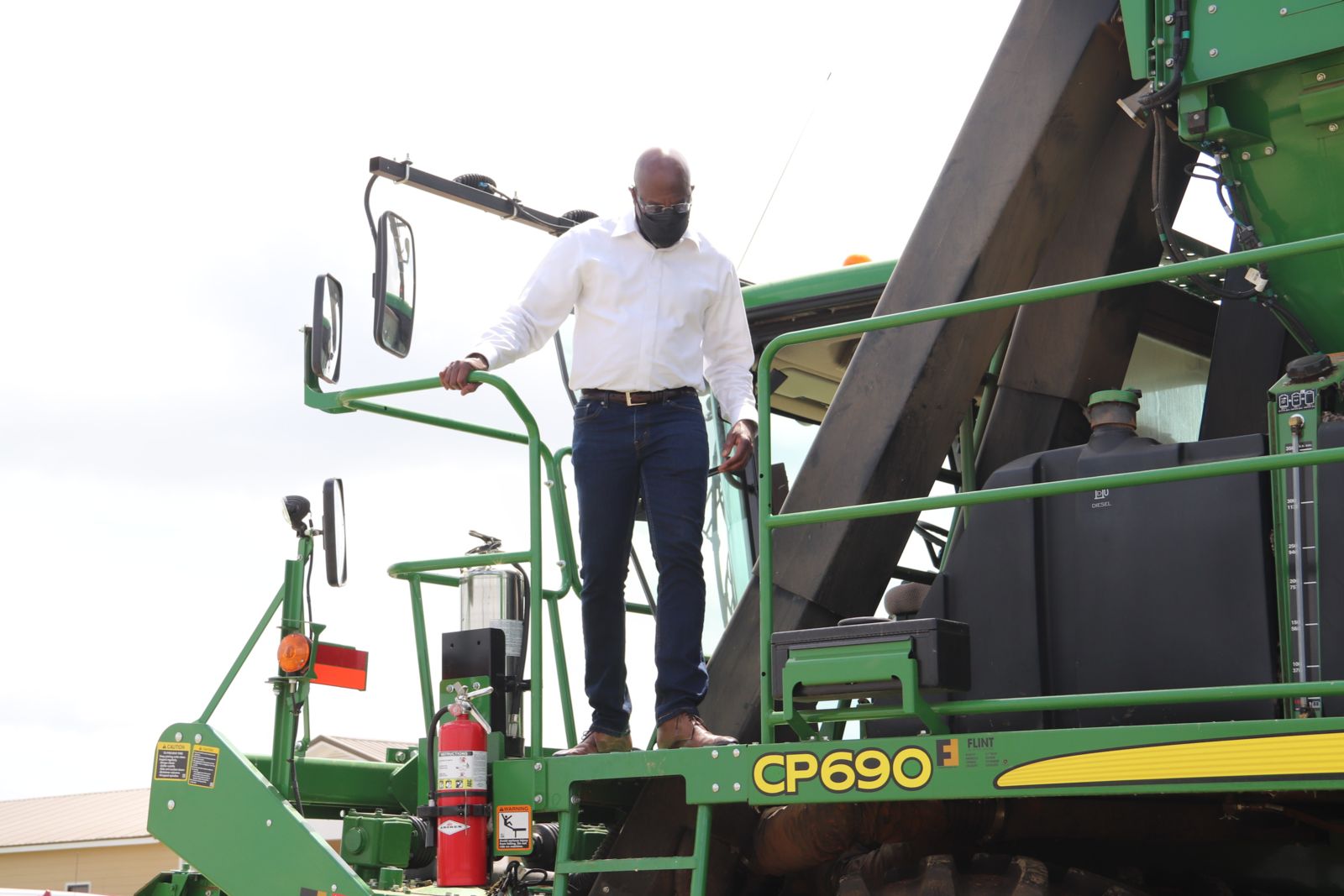test-blog
Sen. Warnock explores Georgia agriculture
Posted on May 17, 2021 12:00 AM
By Jay Stone
U.S. Sen. Raphael Warnock – Georgia’s voice on the Senate Committee for Agriculture, Nutrition and Forestry Agriculture – spent a day this spring visiting Georgia farms and immersing himself in farm life.
During the extensive tour, Warnock shared that he puts peanuts in his Coke. He marveled at the process cotton goes through to become clothing. He climbed on farm equipment and dined outside. Mostly he listened, hearing from numerous farm stakeholder organizations while touring six Southwest Georgia farms March 31.
The ag tour, which Warnock said was his first tour since taking office, allowed producers of a wide array of commodities and from a variety of social backgrounds to share information about their crops and voice concerns about issues they face.
At a kick-off breakfast at Fort Valley State University, Georgia Farm Bureau President Tom McCall introduced Warnock to leaders from several Georgia commodity groups, including: the Georgia Milk Producers, Georgia Poultry Federation, Georgia Cattlemen’s Association, Georgia Forestry Association, Georgia Peanut Commission, Georgia Agribusiness Council, Georgia Pecan Commission and Georgia Peach Growers.
“Farm Bureau has a foot in the door with Sen. Warnock now after meeting with him and all the ag leaders in the state. We let him know that we are ready to work with him,” McCall said. “Since he is on the ag committee, and he is chairman of a subcommittee that deals with trade and risk management and commodities, it’s a very important thing that we need to be able to get to know him and communicate with him.”
Warnock was accompanied by long-time Farm Bureau friend Rep. Sanford Bishop on the tour, which included stops at Minor Farms in Sumter County, Olam Peanut Shellers in Lee County, Lee Cotton Gin in Terrell County, Century Pecan Groves in Lee County, Davis Farm in Colquitt County and Warrior Creek Farms in Worth County
Warnock said he made a point of lobbying for a seat on the Senate Agriculture Committee.
“I wanted the first tour we did to be an ag tour,” Warnock said. “There’s no more important part of our economic viability as a state than the agricultural sector.”
At Minor Farms, fruit and vegetable growers discussed international trade, access to labor, estate taxes and broadband connectivity with Warnock, who also sits on the Senate Committee for Commerce. Warnock voiced concerns over closures of rural Georgia hospitals in recent years and said the state’s expansion of Medicaid could have health and economic implications for rural
Georgians, including farmers.
“We need to make sure a hospital is there when you need it,” Warnock said.
Tift County vegetable grower Bill Brim discussed the H-2A program’s Adverse Effect Wage Rate with Warnock, saying the rule inhibits larger operations like his from handling produce from smaller farms because when they do, the workers have to be paid overtime wage rates from the start.
At Olam, peanut producers noted 30% of U.S.-grown peanuts are exported, though prices have decreased and other countries, notably European nations, have engaged in practices that decreased the value of U.S. peanuts.
At the Davis Farm, Warnock heard how modern tillage practices and Georgia’s large swaths of timber contribute to carbon sequestration and could be a component in a push to overcome climate change.
“It means a lot [that Sen. Warnock asked for an ag tour],” said Colquitt County row crop and cattle farmer Louie Perry III. “He’s not from this part of the state, but it’s very refreshing that he wants to be on the ag committee, he understands the importance of agriculture to the state of Georgia, and that he’s here touring farms across South Georgia.”
At Warrior Creek Farms in Worth County, Warnock visited with owner Ricky Dollison, a fourth-generation farmer who raises hogs and grows corn, peanuts and vegetables. The Dollisons sell their products directly to consumers and for wholesale through their farm website.
Dollison voiced concerns over the costs of Good Agricultural Practices (GAP) requirements under federal food safety rules and expenses that make it difficult for small farmers to transport their farm products to their customers.

Sen. Raphael Warnock checks out a cotton combine during the tour. Photo by Jay Stone